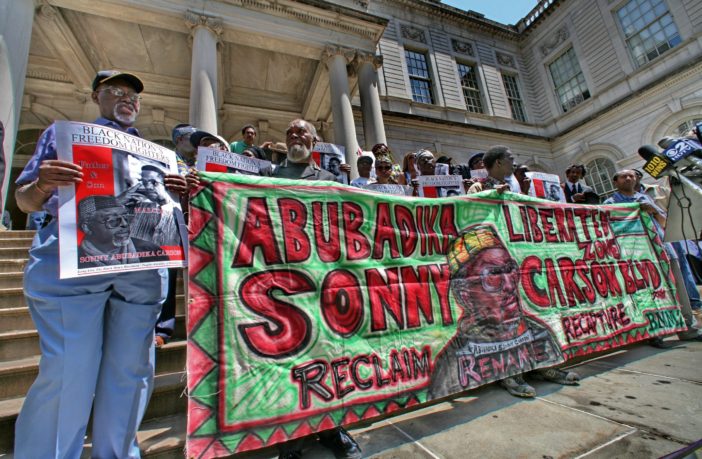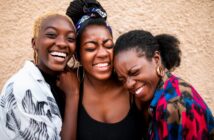Although Brooklyn street warrior Sonny “Abubadika” Carson transitioned to the ancestral realm on Dec. 20, 2002, his influence continues to flow through the youths of the hip-hop generation. This year would’ve marked his 95th birthday, a milestone year to look back at how his behind-the-scenes relationships influenced many positive messages that fortified several artists’ raps.
While living in Bedford-Stuyvesant during the late 1960s and early 1970s, he was an aficionado of that era’s revolutionary rhythms by hip-hop progenitors Amiri Baraka (LeRoi Jones), Nina Simone, The Last Poets, Watts Prophets, and Gil Scott Heron, among others.
“That was his soundtrack,” notes Paradise Gray, an artist, activist, and architect of X Clan, one of the early hip-hop groups to blend rap with Afrocentrism. “He loved all of the foundational artists who laid down our culture for us.”
RELATED: Reflections on Sonny Abubadika Carson: 20 years later
Carson’s son, Lumumba Carson, better known as Professor X, also was a member of X Clan, whose revolutionary and progressive lyrics and themes would become one of hip-hop’s prominent movements during its Golden Era. They released recordings with similar ideologies, namely “Grand Verbalizer,” “Close The Crack House,” “F.T.P.,” and “Exodus.” They also titled a track “The Day of Outrage,” named after the Sonny Carson-led protest against the city’s racial violence, which occurred in late August 1989 following Yusuf Hawkins’ murder. The Black Watch Movement included artists Brother, Isis, Queen Mother Rage, and others.
“We didn’t see ourselves as hip-hop yet,” Gray explains. “We were a continuation of the Black Power and Civil Rights movements.”
Gray then details the Meeting Of The Minds forums during the mid-1980s at the legendary Latin Quarter, a hip-hop venue in midtown Manhattan where the elder Carson built alliances with artists like KRS-One, Just Ice, Stetsasonic, A Tribe Called Quest, Das Efx, Edwin Birdsong, TaharQa & Tunde-Ra Aleem, Native Tongues, Public Enemy, King Sun, Zulu Nation, and more.
“Abubadika served as godfather to Bed-Stuy native Biggie Smalls, as well as to Tupac Shakur, whom he became acquainted with through his mother, Afeni,” reflected his comrade Ali Lamont Jr.
Sonny also had a close alliance with Wu-Tang’s patriarch Popa Wu, aka Freedum Allah, which spanned decades. Popa Wu had a music studio at Bed-Stuy’s Restoration Plaza in the same complex as Sonny’s office, and frequently brought Wu members through to meet him. His 1974 film, “The Education of Sonny Carson,” was prominently sampled on Wu-Tang’s Ghostface Killah’s 1996 debut album Iron Man.
“Lauryn met Sonny when she was young and his film inspired the title of her solo album, “The Miseducation of Lauryn Hill,” theorized Ali Lamont Jr., who once served as Sonny Carson’s bodyguard.
“Sonny had great relations with all the conscious artists. He was jazz in the hood. He gave respect and commanded it as well,” Gray added.
Like this:
Like Loading…



